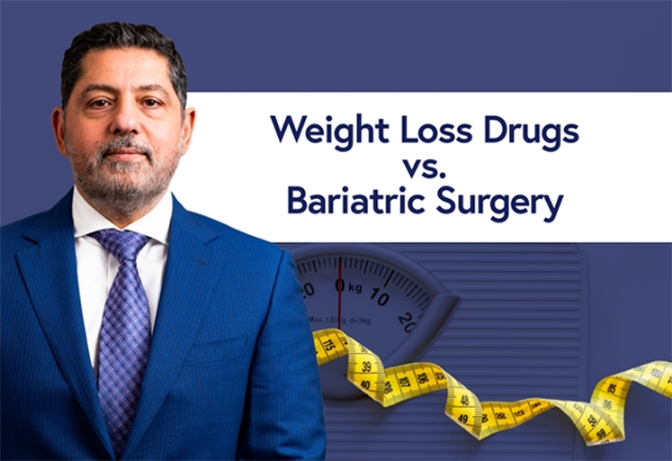Weight Loss Drugs vs. Bariatric Surgery – Which is Right For You?
If you’re trying to lose weight and finding it difficult, you may have considered taking medications or undergoing bariatric surgery. Both of these... read more
Call Us Today (732) 640-5316
E-Waiting RoomIndividuals affected by severe obesity are resistant to long-term weight-loss by diet and exercise. The National Institutes of Health Experts Panel recognize that ‘long-term’ weight-loss, or in other words, the ability to ‘maintain’ weight-loss, is nearly impossible for those affected by severe obesity by any means other than metabolic and bariatric surgery. Bariatric surgeries are effective in maintaining long-term weight-loss, in part, because these procedures offset certain conditions caused by dieting that are responsible for rapid and efficient weight regain following dieting. When a person loses weight, energy expenditure (the amount of calories the body burns) is reduced. With diet, energy expenditure at rest and with activity is reduced to a greater extent than can be explained by changes in body size or composition (amount of lean and fat tissue). At the same time, appetite regulation is altered following a diet increasing hunger and the desire to eat. Therefore, there are significant biological differences between someone who has lost weight by diet and someone of the same size and body composition to that of an individual who has never lost weight. For example, the body of the individual who reduces their weight from 200 to 170 pounds burns fewer calories than the body of someone weighing 170 pounds and has never been on a diet. This means that, in order to maintain weight-loss, the person who has been on a diet will have to eat fewer calories than someone who naturally weighs the same. In contrast to diet, weight-loss following bariatric surgery does not reduce energy expenditure or the amount of calories the body burns to levels greater than predicted by changes in body weight and composition. In fact, some studies even find that certain operations even may increase energy expenditure. In addition, some bariatric procedures, unlike diet, also causes biological changes that help reduce energy intake (food, beverage). A decrease in energy intake with surgery results, in part, from anatomical changes to the stomach or gut that restrict food intake or cause malabsorption of nutrients. In addition, bariatric surgery increases the production of certain gut hormones that interact with the brain to reduce hunger, decrease appetite, and enhance satiety (feelings of fullness). In these ways, bariatric and metabolic surgery, unlike dieting, produces long-term weight-loss.

Dr. Ragui Sadek is a premier surgeon who established a state-of-the-art and one of the safest bariatric surgery programs in the state. Dr. Sadek has fellowship training in both laparoscopic/bariatric surgery and surgical trauma/critical care, allowing him to safely perform complex surgeries on patients who have been turned down by other practices. As a Clinical Assistant Professor of surgery at RWJ Medical School & the Director of bariatric surgery program at RWJ University Hospital, Dr. Sadek offers a cutting-edge range of laparoscopic, robotic, & bariatric surgical procedures with a complication rate substantially below the national average.
Dr. Sadek is a Clinical Assistant Professor of Surgery at Rutgers-Robert Wood Johnson Medical School and a Fellow of the American College of Surgeons. Having performed more than three thousand advanced surgical procedures, Dr. Sadek has established a strong patient satisfaction rate and a solid reputation among the surgical community and is renowned as a top physician in his field by International Association of Healthcare Professionals. As a board-certified surgeon, he holds affiliations with the American Society of Metabolic and Bariatric Surgery and the Society of American Gastro Endoscopic Surgeons. More about Dr. Sadek
Stay current with Advanced Surgical & Bariatrics of New Jersey

If you’re trying to lose weight and finding it difficult, you may have considered taking medications or undergoing bariatric surgery. Both of these... read more

Are you frustrated with your inability to lose weight? Tired of being trapped in an endless cycle of yo-yo dieting, over-exercising, cleanses, and... read more